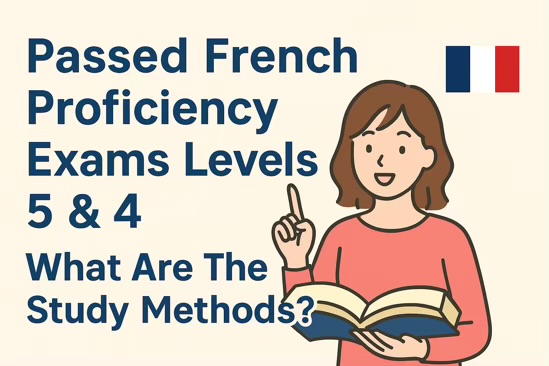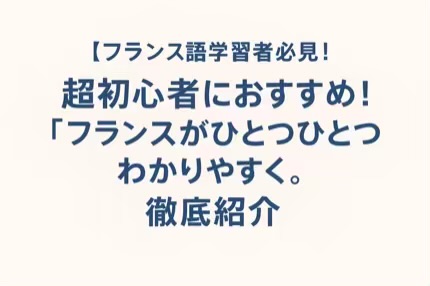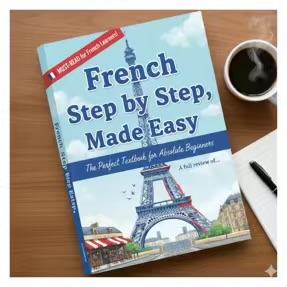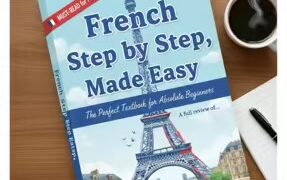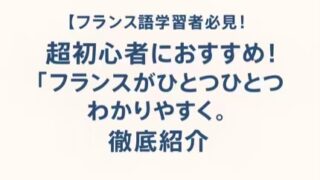Bonjour!
Last year, I took both the Grade 5 and Grade 4 French Proficiency Tests on the same day – and successfully passed them both!
In this article, I’ll introduce the textbooks I used and the study methods that helped me prepare.
I hope this will be useful for anyone planning to take the exams in the future.
Study Period and Scores
This time, I had about two and a half months to prepare for the exams.
I spent one month studying for Grade 5, then shifted focus to Grade 4 for the remaining month and a half.
On average, I studied for about two hours a day, both on weekdays and weekends, making good use of my commute time to review vocabulary and listen to audio.
Here are my results.
<Grade 5>
Reading : 54/60, Listening : 24/40, Total : 78/100
<Grade 4>
Reading : 46/66, Listening : 34/34, Total : 80/100
For some reason, I actually scored higher on the more difficult Grade 4 test.
📚 Textbooks and Study Materials I Used
(1) Penelope the Clumsy: Fun & Easy French Conversation – 120 Useful Phrases by Athénée Français
(2) French Vocabulary: “I’m Too Humble to Call Myself the King of Words!” by Tomohiko Kiyooka
(3) Strategies and Practice for Passing the French Proficiency Test Grade 5 by Yuji Fujita
(4) Strategies and Practice for Passing the French Proficiency Test Grade 4 by Masashi Umehira
Study Methods
(1) Penelope the Clumsy
This book is designed for complete beginners.
Each page features a cute illustration, a short French dialogue, and a simple explanation.
Because of its clear explanations and adorable visuals, it’s easy to keep motivated even if you’re totally new to French.
How I Used It
・Listened to the audio and checked my pronunciation
・Reviewed the usage and grammar explanations
・Practiced daily listening and reading aloud
・Memorized key phrases by heart
For listening, I used an app called Audipo, which allows you to adjust playback speed (free, or about ¥200/year for the premium version).
For memorization, I used Quizlet — I created my own custom flashcards and practiced translating from Japanese to French repeatedly.
In the end, I could actively use about 80% of the 120 phrases in conversation.
(Technically, I started using this book about six months before the exams, so I had been in touch with French a bit longer than the 2.5 months of focused study.)
(2) French Vocabulary
I used this one just like an English vocabulary book —
listening to the audio while checking pronunciation and meaning, and reading aloud many times.
I also registered the words in Quizlet to review them with flashcards.
This book contains about 1,500 essential words, covering levels from Grade 3 to 5 of the French Proficiency Test.
I only managed to learn about 800 words (roughly 50–60%), but that was enough to pass Grade 4.
I originally planned to go further and memorize example phrases too, but after the exams, I handed the book to my wife — for the following reasons.
⚠️ The Downsides of This Book
・Too many dad jokes…
The example sentences are full of quirky “oyaji-gags” (Japanese-style dad jokes).
Personally, they were a bit painful to endure for me — but my wife absolutely loved them and still uses the book happily.
If you used to struggle with stiff, formal language learning in school, this humorous approach might actually help you relax and enjoy studying.
・The voice recordings seem to be by the author himself
It’s rare, but the Japanese lines are apparently read by the author —
and since he also reads out his own dad jokes, the result is… quite unique.
Here’s one example from the book:
aa
“J’aime le goût de tes baisers.” → I love the taste of your kisses♡(Squeals!)
(Don’t worry — the “Squeals!” isn’t in the audio track!)
If you enjoy humor, it’s a fun and well-made vocabulary book.
It even has over ⭐️⭐️⭐️⭐️ (4-star) reviews on Amazon.
As for me… I’ll just say it gave me chills for a different reason.
(3) & (4) French Test Preparation Workbooks (Grades 5 & 4)
Since I started with almost no grammar knowledge, these were pretty tough at first.
I recommend studying the basics with another beginner book before tackling them.
That said, the content is excellent — it thoroughly covers the test format and scope.
By solving each section repeatedly, I was able to score consistently above the passing line on the real exams.
For the Grade 4 exam, I didn’t have time to finish every grammar topic,
but I compensated with strong vocabulary and listening skills — and passed successfully.
💡 Tips for Learning French
At the beginner stage, don’t stress too much about verb conjugations.
French grammar can be trickier than English, especially with all those verb endings.
If you try to memorize everything perfectly from the start, you’ll quickly lose motivation.
At the 4th–5th grade level, small mistakes won’t prevent you from passing.
The best approach is to enjoy learning the basics first,
and start digging into grammar once you naturally feel,
“I want to express myself better in French!”
My Core Philosophy for Language Learning
Although I’m a math teacher, I’ve also had opportunities to teach English, so I’ve spent years experimenting with effective ways to learn languages.
Here are the three key principles I’ve discovered:
1. Have a Clear Purpose
Continuing is everything in language learning.
Without a clear reason, motivation fades quickly.
It’s often said that “the best way to learn a language is to date someone who speaks it” — in other words, you need a human reason to connect through that language.
For me, my goal was to learn deeply enough to teach my students.
2. Balance the Four Skills (Especially Output)
Many people study just for reading and listening tests, but focusing also on speaking and writing actually improves all four skills faster.
Some research suggests that a study ratio of 30% input : 70% output
is one of the most effective approaches.
3. Dedicate Enough Time
Ultimately, language learning comes down to time and consistency.
I’ve never met anyone (non-native) who became fluent without putting in serious hours.
Efficiency is important — but 10 minutes a day won’t take you far.
In my experience, your language ability depends on (aptitude) × (efficiency) × (time).
If any of these factors are too small, progress will be limited.
I hope these study methods and reflections help you find your own way to enjoy learning French!
Bonne chance! 🇫🇷✨
これはCTAサンプルです。
内容を編集するか削除してください。

